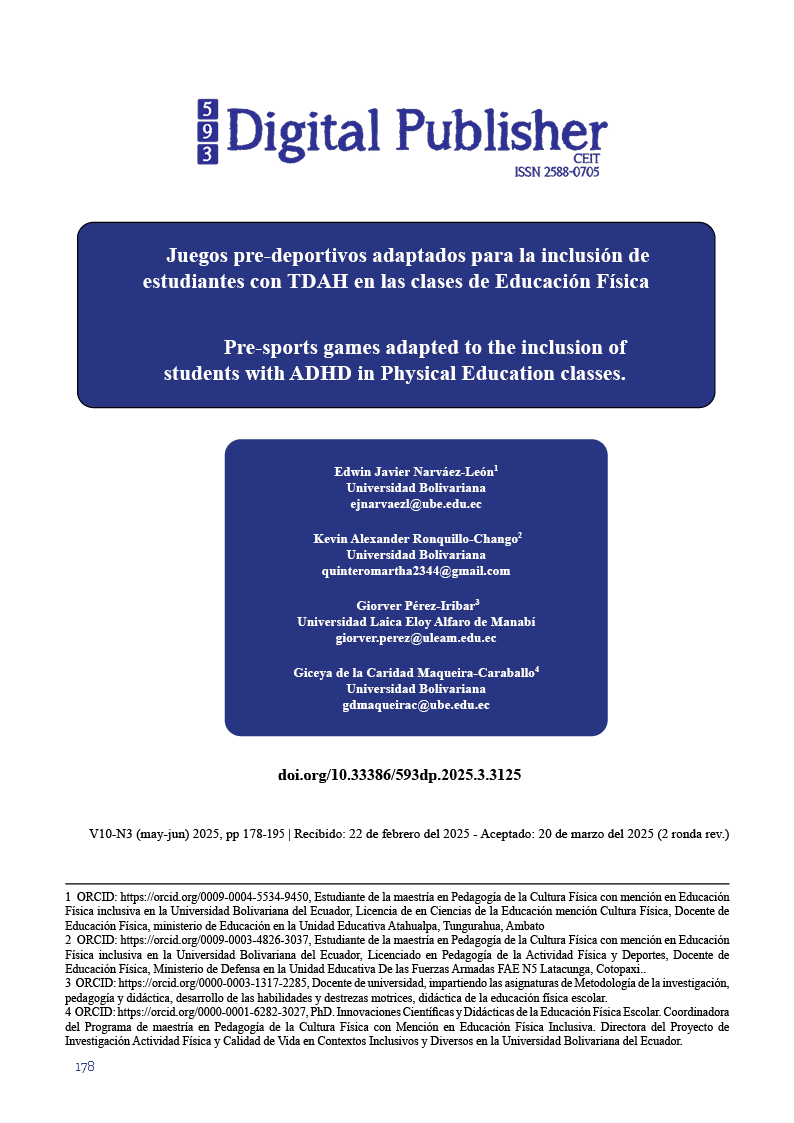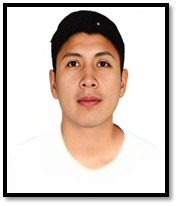Pre-sports games adapted to the inclusion of students with ADHD in Physical Education classes.
Main Article Content
Abstract
Pre-sports games are valuable resources for the inclusion of students with Attention Deficit Hyperactivity Disorder (ADHD). Attention Deficit Hyperactivity Disorder (ADHD). This study presents a system of system of adapted games designed to promote the inclusion of children with ADHD in Physical Education Physical Education classes in the Atahualpa Educational Unit, Ambato. The initiative arises from the limited participation of 5th grade students, Parallel A, in these classes. A qualitative methodological approach was used at a qualitative methodological approach was employed, using a descriptive and cross-sectional design. cross-sectional design. Theoretical methods such as the historical-logical and the analytical-synthetic, as well as the analytical-synthetic, as well as empirical methods that included documentary analysis, observation and semi-structured interviews. analysis, observation and semi-structured interviews with teachers and students. The validation of the proposal was carried out through a pedagogical experience that incorporated essential feedback to adjust the system and guarantee inclusion. The results of the diagnosis show a worrying lack of inclusion, reflected in the low participation and few social interactions of students with ADHD. Therefore, it is crucial to implement methodological changes and create an environment that encourages participation. The pre-sports games system includes adaptations in materials and rules, ensuring that all participants enjoy and benefit. This strengthens motor and social skills, promoting an environment of respect between students with and without disabilities. Validation showed satisfaction among students for the classes and the interactions achieved, supporting the sustainability and expansion of this inclusive proposal.
Downloads
Article Details

This work is licensed under a Creative Commons Attribution-NonCommercial-ShareAlike 4.0 International License.
1. Derechos de autor
Las obras que se publican en 593 Digital Publisher CEIT están sujetas a los siguientes términos:
1.1. 593 Digital Publisher CEIT, conserva los derechos patrimoniales (copyright) de las obras publicadas, favorece y permite la reutilización de las mismas bajo la licencia Licencia Creative Commons 4.0 de Reconocimiento-NoComercial-CompartirIgual 4.0, por lo cual se pueden copiar, usar, difundir, transmitir y exponer públicamente, siempre que:
1.1.a. Se cite la autoría y fuente original de su publicación (revista, editorial, URL).
1.1.b. No se usen para fines comerciales u onerosos.
1.1.c. Se mencione la existencia y especificaciones de esta licencia de uso.
References
Aguilar Morocho, G. E., costa Carrasco, M. F., & aqueira Caraballo, G. de la C. (2024). Actividades físico-recreativas para la inclusión de estudiantes con trastorno por déficit de atención e hiperactividad a la educación física. AlfaPublicaciones, 6(4), 101-124. https://doi.org/10.33262/ap.v6i4.560
Blázquez, D. (2017). Las competencias del profesor de Educación Física. Gestión didáctica [Conferencia].
Castillo-Paredes, A., Montalva Valenzuela, F., & Nanjarí Miranda, R. (2021). Actividad Física, Ejercicio Físico y Calidad de Vida en niños y adolescentes con Trastorno por déficit de atención y/o hiperactividad. Revista Habanera de Ciencias Médicas, 2(5).
Celaya, N. B. (2022). Educación inclusiva en adolescentes con discapacidad intelectual. [Repositorio Digital de la Universidad Fasta]. http://redi.ufasta.edu.ar:8082/jspui/handle/123456789/331
Córdoba, E. F., Lara, F., & García, A. (2017). El juego como estrategia lúdica para la educación inclusiva del buen vivir. , Revista de la Facultad de Educación de Albacete, 32(1), (81-92.
Cuartas Lopez, Y. A. (2024). Desafiando con Juegos Predeportivos: Estrategias y Habilidades. Eduteka. https://www.google.com/url?sa=t&source=web&rct=j&opi=89978449&url=https://edtk.co/p/105953&ved=2ahUKEwjzi7PR3rSKAxX5RTABHba5MeUQFnoECCwQAQ&usg=AOvVaw2acMMkFE9uwPdwrYxv6TUN
Gresham, F. M. (2001). Assessment of social skills in children and adolescents. Handbook of psychoeducational assessment: Ability, achievement, and behavior in children, 325-355. https://doi.org/10.1016/B978-012058570-0/50013-6
Gutiérrez Salmerón, J. F., & Molina García, V. (2020). La educación física y sus beneficios en el alumnado TDAH. Universidad Almería. https://www.google.com/url?sa=t&source=web&rct=j&opi=89978449&url=https://repositorio.ual.es/bitstream/handle/10835/10113/GUTIERREZ%2520SALMERON%252C%2520JUAN%2520FRANCISCO.pdf%3Fsequence%3D1%26isAllowed%3Dy&ved=2ahUKEwjElNr56a2KAxWfo7AFHRt3Kw8QFnoECBYQAQ&usg=AOvVaw1EfE_TDh8gj4GqDw1dJZsg
MaaCFormación. (2023). Juegos predeportivos para Educación Física. https://www.google.com/url?sa=t&source=web&rct=j&opi=89978449&url=https://www.maacformacion.es/noticias/juegos-predeportivos/&ved=2ahUKEwj2u7yd-q2KAxUuQjABHY79MeIQFnoECDQQAQ&usg=AOvVaw2f2Nz9C8Nnnka5GmF6i2VT
Miño-Navas, N. del P., Jijón-Paredes, J. C., Castillejo-Olán, R. ,., & Maqueira-Caraballo, G. de la C. (2024). Estrategia pedagógica inclusiva para el desarrollo de habilidades deportivas en estudiantes con necesidades educativas intelectuales. PODIUM - Revista De Ciencia Y Tecnología En La Cultura Física, 19(14), e1593.
Páez Basabe, M., Arcia Melgarejo, S., Escalona García, C., Vargas Géliga, E., & Darias Ávila, Nancy. (2022). Folleto de juegos predeportivos correctivos compensatorios para educandos con discapacidad intelectual. Podium. Revista de Ciencia y Tecnología en la Cultura Física, 17(3), 1006-1017.
Palacios, -, García, Palacios, T., & -. (2024). Adaptaciones curriculares y su importancia en estudiantes con necesidades educativas especiales. Revista Interdisciplinaria de Humanidades, Educación, Ciencia y Tecnología, X(18). https://doi.org/10.35381/cm.v10i18.1273
Quintero Ayala, L. E. (2020). Educación inclusiva: Tendencias y perspectivas. Educación y Ciencia, 24, e11423. https://doi.org/10.19053/0120-7105.eyc.2020.24.e11423
Rodriguez Antayhua, S. K., & García Rodríguez, N. S. (2024). Camino hacia la inclusión educativa: Beneficio para todos. Horizontes. Revista De Investigación En Ciencias De La Educación, 8(32), 511. https://doi.org/10.33996/revistahorizontes.v8i32.741
Román Majín, Y., Zaballa González, M. de las M., Lara Caveda., D., & Consuegra Morgado, E. Z. (2021). Juegos pre-deportivos de fútbol y sus beneficios para estudiantes con discapacidad intelectual. Olimpia, 18(3), 208-220.
Rusca Jordán, F., & Cortez Vergara, C. (2020). Trastorno por déficit de atención con hiperactividad (TDAH) en niños y adolescentes. Una revisión clínica. Revista de Neuro-Psiquiatría, 83(3), 148-156. https://doi.org/10.20453/rnp.v83i3.3794
Tomlinson, C. A. (2014). The Differentiated Classroom: Responding to the Needs of All Learners. (2a Edición). ASCD, Alejandría.
Valdiviezo Cuenca, G. C., & Carvajal Zambrano, G. V. (20214). As estrategias lúdicas para fomentar la inclusión en los estudiantes con necesidades educativas especiales. Maestro y Sociedad, Número Especial Vinculación Sociedad y Educación, 240-249.
Vargas-Cuenca, G. M., & Ávila-Mediavilla, C. M. (2022). Juegos predeportivos como estrategia metodológica en la práctica del fútbol en adolescentes escolarizados. Revista Interdisciplinaria de Humanidades, Educación, Ciencia y Tecnología, VIII(3). http://dx.doi.org/10.35381/cm.v8i3.800





